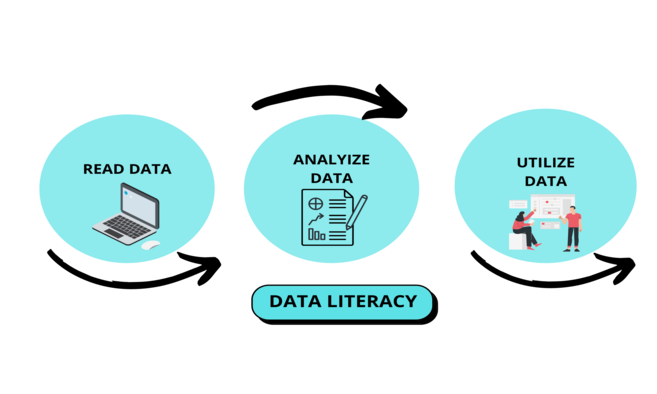
What is data literacy?
Data literacy is the ability to read, write, analyse, and utilise data. The importance of Data Literacy is critical as everything is going digital. You don’t have to be a data scientist to be data literate. Data literacy does not require knowledge of every computer language or the mastery of the most advanced data science skills. Instead, it’s about understanding and making factual judgments to interpret the data and make the right business decisions.
A company’s journey to being data fluent begins with achieving data literacy. It specifically assists employees in critically interacting with data, forming effective data governance, and making data-driven decisions.
What is the importance of data literacy?
- Boost company performance
When it comes to data-related discussions, it’s critical that everyone in the organisation feels at ease and confident. Employees may add new ideas to the conversation and have constructive, beneficial debates that lead to better decision-making and innovation, by developing data literacy among all employees, not just a chosen few.
- Individual growth
Employees should be able to utilise data to bring clarity that impacts both their daily operations and large-scale choices. It can help every employee reach their goals, do their jobs better, and contribute to overall corporate success if implemented correctly.
- Make strategic decisions
It also permits people to make decisions that are contrary to their first instincts or gut feelings. When you’re forced to look at data, figures, and facts, you may have a more organized discourse while removing personal sentiments from the topic. You can make more confident judgments if you have the correct dashboards, analytics, insights, and knowledge of what the data is revealing.
- Optimum utilization of insight
Being able to critically examine the authenticity of the data used to produce visualisations requires being data literate. Individuals should be able to identify mistakes by questioning the data sources’ dependability, accuracy, and consistency. Thus, boosts the company’s confidence and efficacy in making data-driven choices. They analyse, evaluate, and challenge data analysis results, and place them in the context of the organisation’s bigger strategy and overall objectives.
Conclusion
It is critical for everyone in an organisation to understand why data literacy is so crucial, and by allowing everyone access to the data, you can simplify and optimise your process of interpreting the data and making strategic decisions for your company.
The basic ability to read and utilise data is very important for everyone in your organisation, not just data analysts. When your organisation is data literate, not only can it make decisions based on facts, but users can also play with the data to unearth new insights and possibilities. The key to your company’s future is to use data rather than merely gather it.

